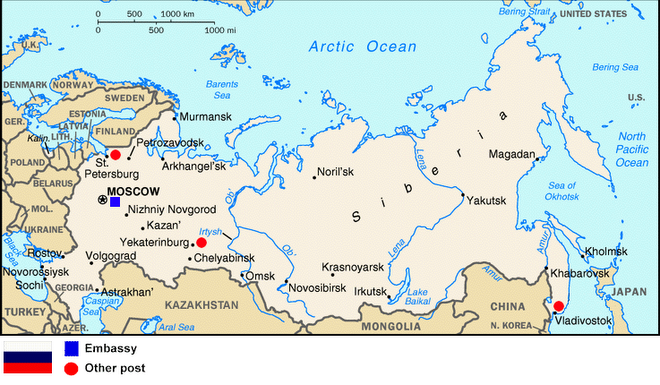The Litvinenko saga has now, of course, segued into the Lugovoi saga and over the last week I was surprised to find myself in demand as a pundit for the BBC; commenting on the state of Russo-British relations. This had come about after I wrote a piece for one of the Moscow papers profiling Britain’s new Foreign Secretary, which appeared just as it became clear the UK government was about to deliver its response to Russia’s refusal to extradite Andrey Lugovoi.
So, over the last few days I have been on BBC TV 2’s ‘Daily Politics’ and BBC Radio 5’s “Wake up to Money”; interviewed twice by Rupert Wingfield-Hayes – very nice bloke – for BBC Radio’s ‘World Tonight’ and BBC TV 1’s ‘Six o’clock news’; as well as a live – and feisty appearance – on BBC World TV; just after the Russian foreign ministry bounced back their response to Britain’s response, as-it-were. [although a London friend sniffed: "well you've not done 'Newsnight' dear, so I should tone down the puppy-dog enthusiasm until you make it there...]
The BBC World presenter was, I could tell – remotely from the Moscow bureau where I could hear him but not, of course, see him – angry that I wasn’t towing the British line. Quite the contrary, I said, Russia’s behavior was “very restrained in the face of Britain’s provocation…and this restraint shows that President Putin’s Russia is committed to international partnership…but Britain must treat Russia with respect…”. Even I was slightly surprised I kept a straight face while saying this, it just tumbled out, albeit entirely on-message with the line I wanted to take.
These are the first times I have done TV or radio about Russia; but at another time in my career I did a lot of TV and radio. I reckon around 100 interviews by now, mostly live: I prefer live to pre-recorded, just because – and this is purely luck rather than skill – I can normally deliver answer the question and then pivot—to-message before most interviewers have thought what they want the next question to be…that extra 5 seconds+ or so they end up giving me, making all the difference. I love live broadcast (and secretly have a hankering to do more of it).
My mother – who only has a patchy grasp on current affairs at the best of times – telephoned me from rural France where she spends half the year, her husband having watched BBC World: “darling, I saw you on television. You’ve lost weight! Well done dear…”
So now each side has satisfied Sovereign honour, it that now it? Are we all back to normal in Russo-British relations? No. I think not. A hint of this was to be found in a report filed Friday on the RIA Novosti newswire, with comments from the president of Russia's Union of Industrialists and Entrepreneurs, Alexander Shokhin.
“Shokhin warned that British companies in Russia may now face difficulties with tax authorities and regulators, and that inspections may become more frequent. "Perhaps, under broadly equal conditions, some companies may fail to win tenders," he said.
“He said that U.K.'s decision to refuse entry visas to Russian officials could be easily applied to the executives of Russia's state-owned enterprises.”
A very sage observation, I would say. In contrast the Brits seem to believe that theirs is an inalienable right that all Russian IPOs, for instance, will go to London. Most of these British politicos are so arrogant and so out-of-touch. And the present government pretty clueless; not helped by the fact that the Russian Desk at the Foreign Office, IMHO, is still intellectually wedded in a 1990s-Atlantacist view of what Russia is, will become and how it should be treated.
In today’s UK media, the Sunday Times has it that, actually, the Brits believe the Litvinenko murder was the FSB. Balls.
- Lugovoi is not the person the FSB would use for this (still less the SVR), but he is the person you would hire for a rogue attack if you weren’t a state entity
- His past in the KGB 9th (Directorate; handles nuclear facility security and VIP protection) means he knows just who exactly to go to both to acquire the material and how to handle it so as not to kill himself
- A multi-million op is no problem for any of the super-rich to fund
There was no reason for the Russian state to kill Litvinenko (his allegations were old and tired and no longer passing the ‘so what’ test), but…
- …increasingly impoverished Litvinenko was rumoured to be for hire to peddle Kompromat on Russia’s new plutocracy. A fairly fatal error in anyone’s book.
- This was an oligarch-ordered killing. 50% likely to be one close to the Siloviki (which is a tad embarrassing for VVP and all) or 50% likely to be one of the diaspora, wanting a ‘false flag’ with which to condemn VVP in the eyes of the world: it was never a Government black op.
I watched – miracle of the Net – the British Foreign Secretary’s statement on Russia streamed live on the Internet. In amongst the toadies, in the subsequent Parliamentary Q&A there was some very good stuff. Sir Malcolm Rifkind – himself a Foreign Secretary – talked about using a Lockerbie trial-type solution. This is something I have written about elsewhere: judicious use of third countries for spying/terrorism trials. Prime Minister Brown disses this idea – “This was a serious crime in Britain…the murder of a British citizen…Britain is the only place for a trial” – one hears the Ministry of Justice doesn’t like a precedent being set that suggests extra-jurisdictional trials are acceptable. Hmm…Do the British actually want a trial or not? They're not being very imaginative about getting one.
In secret bilateral talks, I have cautious optimism that the Russians could agree to an English-law trial taking place in Russia. The British prebuttal of this – our law wouldn’t allow this* - seemed to me extraordinary. How can the UK expect Russia to change its constitution to accommodate London, when not itself prepared to amend its own Administrative law.
* The situation was different for the Lockerbie trial, because that was taking place under the the separate system of law that Scotland enjoys.
In the last few days, I have had some interesting feedback. The expat community in Moscow thinks the British have engaged into a course of action that, while never seriously likely to bring forward a trial (almost as if they don’t really want one), does make the new Prime Minister and his government look ‘tough and strong’ to the British people.
Some Russian contacts, however, say that the eventual, highly moderate response of the Russians only just came about. In truth there was a lot of anger in the Kremlin and several blocks sought a much, much tougher and asymmetric response. One of those most angry, indeed, was VVP himself (he has a very thin skin, actually, people forget and is quick to take offense). Foreign Minister Lavrov and also, I heard, Finance Minister Alexei Kudrin made a sustained and successful argument persuading more moderation by way of response.





No comments:
Post a Comment